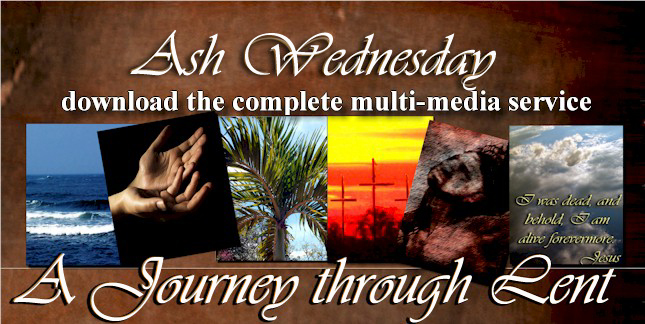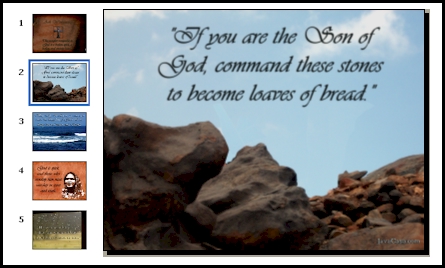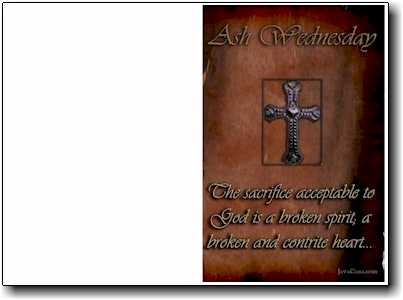|
Ash Wednesday Multi-Media Service

"A Journey Through Lent"
A complete Ash Wednesday Service with select
readings of upcoming Lent and Holy Week passages (based on the RC Lectionary)
and a video meditation.
Download the video presentation here:
Windows Media format (20 MB) /
Apple QuickTime (80MB)
Download the Worship Service
Outline
click here to download
Download the PowerPoint
Presentation
(one slide for each reading):
click here to download

Download the printable bulletin
(Adobe pdf format)
click here to download

Service Outline
(PowerPoint slides are also pictured in the video meditation)
Sermons:
-
HOW TO
CLEAN UP YOUR ACT,
Psalm
51:1-17
by David Rogne
(see excerpt below)
- The Cross of Ashes, various Scriptures
by Rev. Melinda Harwood
(see excerpt below)
- Why Are You Doing
That? Matthew 6:1-8, 16-18
by David Rogne
Create
in me a clean heart Psalm 51
by Rev. Thomas Hall
Children's Messages:
-
"Sorry"
a children's sermon on the meaning of Ash
Wednesday
-
The Book Without Words,
based on Psalm 51
________________________________________________________
Excerpt #1
HOW TO
CLEAN UP YOUR ACT,
Psalm
51:1-17
by David Rogne
The final lesson we learn from the Psalmist is that the
lifting of the burden of guilt is ultimately the result of grace.
Though he felt alienated from God by his guilt, he still believed that
God was prepared to offer mercy and that God's love was steadfast.
The word the Psalmist uses for God's steadfast love is the Hebrew word
"hesed," which comes from the word for "womb." This suggests that
God's steadfast love is equated with a maternal instinct, mother-love,
a love that may be deeply hurt, but that does not turn its back on its
child. Because we feel guilty, we may feel that God has turned his
back on us and that we have to do something to earn back God's love.
But the sense of alienation comes from our side. Our guilt has
created the gap. The gap is bridged by acknowledgement of our
responsibility, confession of what we have done, a willingness to
change our conduct, and reliance on God's steadfast love.
One who understood this gracious aspect of God's forgiveness,
perhaps better than most, was John Newton. At the age of eleven he ran away
from school and went to sea. His early years were an endless cycle of
drunkenness, debauched living, and trouble. He entered the slave trade and
eventually became captain of a slave ship. In the grip of a storm, which he felt
would take his life, he accepted the forgiveness proclaimed by Jesus Christ, and
his life turned around. He never ceased to wonder at the amazing grace of God
which turned him from the slave trade to preaching. For his own epitaph he
wrote, "John Newton, clerk, once an infidel and libertine, a servant of slavers
in Africa, was, by the rich mercy of our Lord and Savior Jesus Christ,
preserved, restored, pardoned, and appointed to preach the Faith he had long
labored to destroy." But his greatest testimony is preserved for us in the
words of his great hymn, with which we will close our service:
"Amazing grace, how
sweet the sound
________________________________________________________
Excerpt #2:
 The
Cross of Ashes The
Cross of Ashes
a sermon based on various Scriptures
by Rev. Melinda Harwood
Today is Ash Wednesday: the first day of the penitent season of Lent.
The accurate name is "The Day of Ashes” not "Ash Wednesday". The
reference to ashes comes from the ceremony of placing ashes on the
forehead in the shape of the cross as a sign of penitence. Pope
Gregory I, who was Bishop of Rome 7th century A.D, introduced this
custom.
Gardeners know that ashes can be used to help grow plants. But
basically ashes are worthless. In fact they are often less than
worthless - they are a hindrance and a liability. You can't make ashes
pretty by painting them, and you can't make ashes smell good by
spraying perfume on them. Ashes are just ashes.
And so it is with us - people are just people. When all is said and
done, no matter how much righteous paint we cover ourselves with, no
matter how much virtuous perfume we spray on ourselves, we are left
with our thoughts and feelings and actions that aren’t always our best
.
So why do we bother tonight smearing ashes on our foreheads? Why do we
gather and remember what we are on Ash Wednesday?
The answer is that while we gather to remember who we are, more
importantly we also gather to remember who God is - and what God has
done for us in and through Jesus Christ.
The Bible has a number of references about ashes. The first comes in
Genesis 18:27. Abraham is bargaining with God to spare the cities of
Sodom and Gomorrah when he suddenly realizes that he, a mere mortal,
has been speaking to almighty God . . . .
click
here for these sermons, children's messages and all other Ash
Wednesday resources.
|